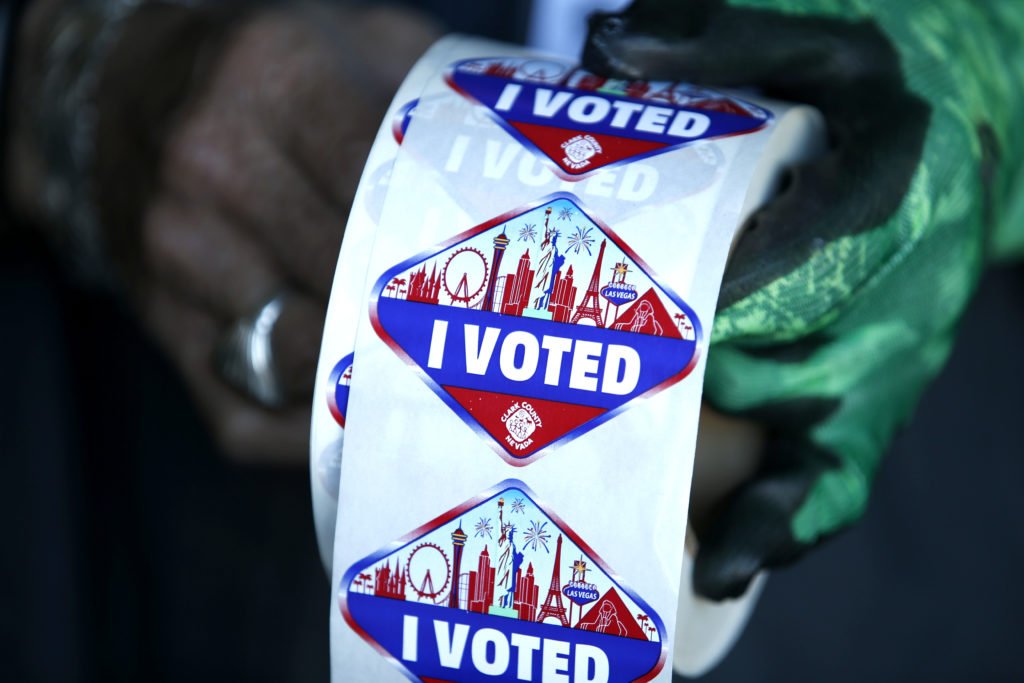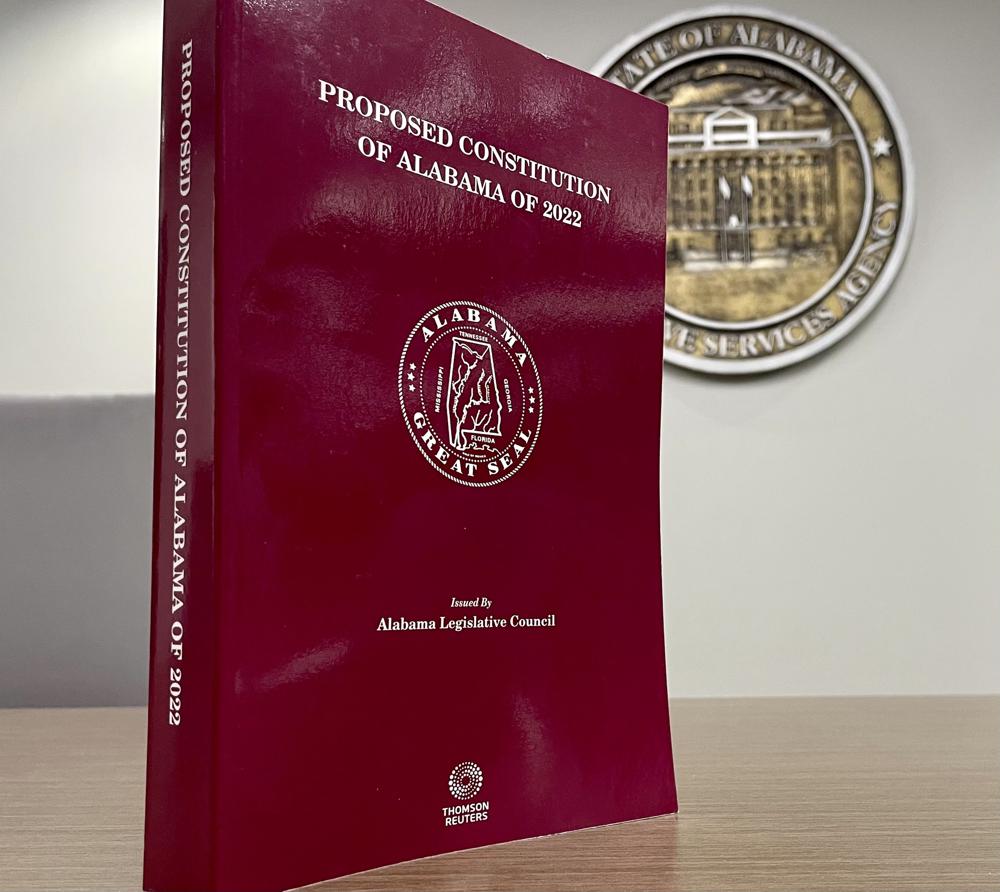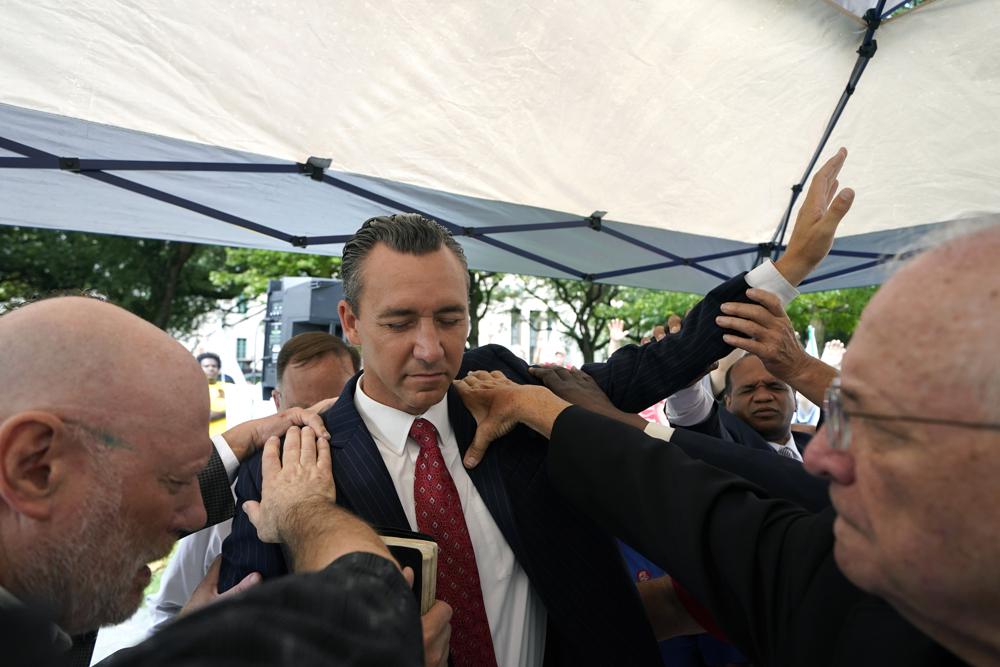Ann Eubank running as a Republican for Alabama State School Board Position – District 3

State School Board District 3 member incumbent Stephanie Bell will not seek another term, setting off a Republican scramble for the post. Conservative activist Ann Eubank is one of four Republican candidates seeking the open seat on the State Board of Education. Eubank said that no issue has been more important to her than excellence in education. Eubank said that her concern over education led to her retiring to become an unpaid full-time citizen lobbyist after witnessing what her grandson was being taught in school. Ann has dedicated the last 15 years to researching and advocating for solutions to the dismal state of affairs in the Alabama Public School System. Eubank said that Alabama public schools’ downward spiral began in 2009 when Common Core was introduced to the State School Board and was adopted the following year despite an outcry from countless parents and voters. “Running for office is the last thing I ever thought I would do, but I decided to run for state school board after Stephanie Bell, representative for School Board District 3, had not yet qualified for re-election,” Eubank said. “It’s imperative that we elect someone who will work to change the trajectory of Alabama education from the bottom of the barrel to the top of the ladder like Florida.” “Parents and students deserve State School Board members who understand this and will listen to their concerns about the serious problems we face in Alabama’s schools,” Eubank continued. “We need a new perspective on the Board. I am the only one running for this position that hasn’t been some part of the education establishment.” Eubank is a member of the Alabama Legislative Watchdogs, a group of citizen lobbyists from all parts of the state of Alabama who give in-depth analysis about legislation being put forth and passed, what it means, and how it impacts citizens. Eubank is also a member of the Jefferson County Mid-Alabama Republican Club (MARC) and has attended countless Republican club meetings all over the state as a speaker and guest. Eubank is a member of Mom’s For Liberty. “At Moms for Liberty, we understand the importance of having liberty-minded school boards throughout the country that are focused on defending parental rights and improving education,” Eubank said. “We hope to activate these types of people to public service. Every child across America deserves access to a quality education. The decisions made by school board members play a crucial role in shaping the quality of that education.” Eubank serves as Co-Chair of the Alabama Conservative Coalition. She has been a Heritage Action Sentinel since 2010. Conservative news/talk radio listeners have heard Ann in occasional radio hosting duties on WYDE and IC Radio in North Alabama. Eubank was a policy advisor for Tim James’ failed 2022 Campaign for Governor of Alabama. Eubank was a Southeastern Cruz Crew team member in Senator Ted Cruz’s presidential campaign in 2016. Eubank was a Cruz delegate at the Republican National Convention in Cleveland that year. Eubank is a member of the National and Alabama Women for Trump group. She was a member of Congressman Mo Brooks’s (R-AL05) 2018 and 2022 Senate Campaign Steering Committees. She is a member of the firearms rights group Bama Carry. Eubank is also a member of the Stop Common Core Alabama Task Force. In that role, Eubank did numerous talks on Common Core, aka National Standards, with politicians and the public. She is also a member of the Alabamians United for Excellence in Education Taskforce and one of the coordinators of the Alabama Opt-Out movement. Eubank’s efforts have been noticed. Ballotpedia identified Ann Eubank as a “top influencer by state” in 2015. She was named on Alabama Today’s 20 Alabamians who belong on any “Most Influential” list. Eubank appeared in the documentary movie “Revelation – Dawn of a Global Government” where she warned how Common Core, aka National Standards, indoctrination would turn our children into “Good Little Socialists.” Eubank has been interviewed by numerous local, state, national, and international radio, print, and television outlets. Eubank has authored many political opinion articles in numerous local and national publications. Eubank participated in Frank Luntz’s HBO Special regarding Roy Moore’s Senate Campaign that aired on HBO and Axios. Eubank, in her role as a leader of the Rainy Day Patriots, helped contribute to the 2010 Republican wave election that led to the GOP taking control of both Houses of the Alabama Legislature and the U.S. House of Representatives. She grew up in Birmingham, Alabama, and now lives in Hoover. She has been married to her husband, Jim, for 55 years. She has two daughters and two grandchildren. Kelly Mooney, former State Representative Charlotte Meadows, and Melissa Snowden have all also qualified to run for the open school board seat. The Republican Primary will be on March 5. No Democrat has qualified, so the eventual Republican nominee will likely be elected. To connect with the author of this story or to comment, email brandonmreporter@gmail.com.
Jefferson County Commission special election weighs heavy on the minds of county commissioners

On Saturday, Jefferson County Commissioners Jimmy Stephens and Joe Knight, both Republicans, spoke to the Mid-Alabama Republican Club (MARC) about the pending change in leadership for the county commission. Currently, the five-member Jefferson County Commission is composed of three Republicans and two Democrats. That could soon change, as the Birmingham Business Alliance (BBA) has selected County Commissioner Steve Ammons, the third Republican on the Commission, as its new CEO. “Steve is going to be the CEO of the BBA,” Commissioner Knight said. “We wish him well. He is looking forward to it.: A special election will be held this summer to fill the vacancy. Jefferson County Republican Party Chairman Chris Brown said, “There is an opening on the Jefferson Co Commission because he is leaving at the end of the month, and we are committed to winning this election. Doug Jones (a Democrat) did beat Roy Moore (the Republican nominee for Senate in 2017). We are taking nothing for granted.” Urologist Dr. Brian Christine announced that he is seeking to be the next commissioner. “It is critical that we keep Republican leadership on the Jefferson County Commission,” Christine said. “The district includes part of Homewood, Leeds, Mountain Brook, Vestavia Hills, Irondale, and part of Hoover.” Com. Stephens said, “I want to thank our entire Jefferson County Legislative Delegation. It’s a team that I am so proud of, that we are so proud of.” Stephens said that the commissioners talk with legislative delegation members weekly while the legislature is in session. “We have a team member who has decided to leave, so you must choose someone from District 5 that will seamlessly continue to do the job, that understands that relationship with your legislators, and has a trust in your existing country commission. We don’t need someone who is going to come in there and go off on a tangent. We need someone who will come in and be part of the team.” Commissioner Knight explained that Ammons’ last day on the job is May 31. “The people in charge of the election are the election commission,” Knight said. “In the event of a vacancy on the Jefferson County Commission, the elections commission will meet, and they will set the date for the special election.” “The special election is tentatively set as July 18,” Knight said. “There are no Republican or Democratic affiliations in this. All it takes is 100 signatures to get on the ballot.” In the other 66 counties, the governor would appoint someone to fill the vacancy, and in the event of a special election, the governor would call the elections and set primaries. Jefferson County is different. State Representative Jim Carns (R-Vestavia Hills) explained, “That was done in 2009. I was not in the legislature then I was on the Commission. They were trying to protect the governor (then Bob Riley) and who he had appointed – George Bowman. It is a terrible deal.” “Talking to some of our legislators, we might need to change that,” Knight said. “We could not do what we do without your legislative support,” Stephens said. “You. raise the money for Jefferson County to attempt to spend wisely,” Stephens said, addressing the audience. “Jefferson County is not an economic engine. It creates an environment for you to be successful. It has to make your life better and give you a reason to work and raise your family in Jefferson County.” Knight said that the July primary is going to pose some logistical problems. “Some of the polls may have to be moved because they are having their vacation Bible school,” Knight said. Stephens said that he and Knight have spoken with Dr. Christine and like him, but they are not telling anyone who to vote for. Stephens expressed concern that the City of Birmingham and Mayor Randall Woodfin may be recruiting a candidate for the position. The Mid-Alabama Republican Party meets on the second Saturday of each month at the Vestavia Hills Public Library at 9:00 a.m. To connect with the author of this story or to comment, email brandonmreporter@gmail.com.
DA drops charges against Perry Hooper

On Monday, the Montgomery District Attorney dropped the sex abuse charge against former State Representative Perry Hooper Jr. after his accuser asked that the charges be dropped. “The State of Alabama has concluded that without the victim’s testimony and cooperation, the evidence would be insufficient to attain a conviction,” Chief Deputy District Attorney Azzie Taylor wrote in a motion filed in Montgomery County Circuit court on Monday morning. Hooper, age 68, was indicted on sex abuse charges by a Montgomery County grand jury last month. Hooper was arrested in August after an incident at a downtown Montgomery restaurant on Commerce Street. The alleged victim, Elizabeth Daly, wrote in a statement released to Alabama Today, “I have asked that any charges against Perry Hooper be dismissed. The matters relating to Mr. Hooper and me have been resolved, and going through the turmoil of a trial would provide no more justice than getting a sincere public apology from Mr. Hooper. I so respect and appreciate law enforcement and the job they have to perform. Nevertheless, I request these charges be dismissed.” Daly has asked that the press respect her privacy and not contact her. When asked for comment, Hooper told Alabama Today to refer all questions to his attorney. Hooper is a member of the Alabama Republican Party Executive Committee representing Montgomery County and a member of the Board of the Alabama Music Hall of Fame. Hooper was a frequently published political commentator whose columns were frequently published at 1819 News and the Montgomery Advertiser. According to an affidavit, Hooper approached a woman (Daly) working at a restaurant from behind and allegedly grabbed her breasts and waist in an unsolicited embrace while shoving his pelvis against the victim’s backside and began kissing her neck before she was able to break free. Hooper’s next court date was scheduled for December 21 with Circuit Judge J.R. Gaines. Hooper is represented by veteran Montgomery defense attorney Joe Espy. Hooper served in the Alabama House of Representatives from 1983 to 2002. Hooper was an early backer of Donald Trump in the 2016 Republican primary season and chaired the Trump Victory Fund in the 2016 campaign. Hooper was a frequent visitor to the Trump Whitehouse and Trump’s Mar-A-Lago Resort. Hooper’s father, Perry Hooper Sr. – now deceased, was the first Republican Chief Justice of the Alabama Supreme Court since Reconstruction. Hooper is married and has three sons and a number of grandchildren. Hooper Jr. was one of six finalists that then-Gov. Robert Bentley considered for appointment to the U.S. Senate in 2017. That appointment instead went to Luther Strange. Hooper endorsed Strange rather than running in the Republican primary. Former Chief Justice Roy Moore defeated Sen. Strange in the primary but lost to Clinton-era U.S. Attorney Doug Jones in the special election. An indictment is merely the finding by a grand jury that the prosecution has presented enough evidence for a jury trial to take place. An indictment is simply a formal accusation. Under the American justice system, all persons are presumed innocent unless found guilty by a jury of their peers. To connect with the author of this story, or to comment, email brandonmreporter@gmail.com.
Foundation for Moral Law cheers Air Force vaccine victory

The Foundation for Moral Law, an Alabama nonprofit dedicated to the defense of religious liberty, applauded the November 29 Doster v. Kendall decision of the Sixth Circuit U.S. Court of Appeals affirming a lower court class-wide injunction prohibiting the Air Force from requiring personnel with religious objections to undergo COVID vaccinations. Eighteen plaintiffs sued Air Force Secretary Frank Kendall and others in February 2022. Prior to the lawsuit, the Air Force had required all personnel to get the Covid-19 vaccine. The plaintiffs in the case argued the mandate violated their religious freedom under the First Amendment and the Religious Freedom Restoration Act of 1993. The District Court agreed. The District Court later expanded the order into a class injunction protecting all USAF personnel with religious objections. The Air Force appealed to the Sixth Circuit, and the Foundation filed an amicus brief supporting those who had religious objections. The Sixth Circuit unanimously affirmed the lower court’s order. The Foundation argued that, although the Air Force had established a policy for considering religious exemptions, the Air Force, in fact, did nothing but rubberstamp denials. The plaintiffs argued that the Air Force granted about 135 of 10,000 requests for vaccine exemptions for religious reasons — and then only to those planning to leave the service. The Liberty Counsel, a non-profit organization that litigates in cases the organization believes involve religious freedom, stated, “The Air Force even agreed that it has not granted any religious exemptions to anyone who does not plan to leave the service within a year. On the other hand, in December 2021, there were a total of 2,047 service members currently with medical exemptions and 2,247 service members currently with administrative exemptions.” The Court agreed and further reasoned that because the Air Force granted thousands of medical and administrative exemptions, their argument that military necessity prevents religious objections was unpersuasive. The Court concluded that First Amendment and the Religious Freedom Restoration Act both protect military personnel. Judge Roy Moore, Founder and President Emeritus of the Foundation and a West Point graduate, hailed the decision as “a long-overdue victory for military personnel over a flawed and useless policy that has ruined the careers of many soldiers and the health of many others.” Foundation Senior Counsel John Eidsmoe, primary author of the amicus brief and a retired Air Force Judge Advocate, noted, “The Sixth Circuit accepted our argument that the USAF failed to give its personnel the individualized determinations that the Constitution requires in Stanley v. Illinois.” Colonel Eidsmoe added, “I love the Air Force, but I also love the men and women who wear Air Force blue, and I believe they are entitled to the protection of the Constitution they have sworn to defend.”
Libertarian Jimmy Blake says state needs to change ballot access law

On Friday, Jimmy Blake told Alabama Today that the State of Alabama has the most restrictive ballot access law in the country and that that needs to change. Blake was the Libertarian Party of Alabama nominee for governor in last week’s general election. On November 8, Blake received 45,823 votes – 3.25 percent of the votes cast – in his failed bid to be governor of Alabama. Kay Ivey was reelected to another term with 944,845 votes – 66.93% of the vote. Blake also was unable to achieve a high enough threshold for the Libertarian Party to have automatic ballot access in the 2024 election. “In 48 states, all but Kentucky and Alabama, I would have gotten enough votes for the party to have had ballot access,” Blake said. For a minor party to remain on the ballot in Alabama, one of its statewide candidates has to achieve 20% of the general election vote. Democratic nominee Yolanda Rochelle Flowers received just 29.16% of the vote in the governor’s race. That was the poorest showing for a Democratic gubernatorial candidate in Alabama history, down from Walt Maddox’s 40.4% just four years ago. None of the 65 Libertarian candidates on the ballot in last Tuesday’s general election were victorious. In the U.S. Senate race, Libertarian nominee John Sophocleus received just 2.32% of the vote (32,790 votes), and Democratic nominee Will Boyd received 30.87% (435,428 votes), while Republican Katie Britt received 66.64% (940,048 votes). Where Libertarians did best were in races where there was a Republican running but no Democrat. In the Lieutenant Governor’s race, Republican incumbent Will Ainsworth coasted to victory with 83.69% of the vote (955,372 votes). Still, with no Democrat in the race, his Libertarian opponent, Ruth Page Nelson, received 15.60% of the vote – 178,069 votes – still short of that 20% threshold required by Alabama state law. 1,411,756 people voted in the governor’s race, but only 1,141,507 votes in the Lieutenant Governor’s race, a drop off of 270,639 voters. Many of those voters who dropped off the ballot were Democrats who voted a straight-party ticket without making a preference in races where the Alabama Democratic Party failed to recruit a candidate. Candidate qualifying was over, and the ballot was set before new Democratic Party Chairman Randy Kelley was even elected. No Democrat won a statewide race on Tuesday. In fact, Doug Jones’s surprise victory over former Chief Justice Roy Moore in the 2017 special election for U.S. Senate is the only win for a Democrat in a statewide race in Alabama since 2008. The unlikely chance that a Democrat can win a statewide race in Alabama has made it extremely difficult for the Alabama Democratic Party to recruit candidates or for Democratic or non-Republican candidates to raise money. Where Libertarians came closest was in the race for Public Service Commission Place 2 race. There incumbent Republican Chip Beeker received 83.18% (929,248 votes), while Libertarian nominee Laura Lane received 16.05% (179,302 votes). “Laura Lane had enough votes for 49 states, even Kentucky, which has the second hardest ballot access at ten percent,” Blake said. The Libertarian candidates for PSC Place 1, State Auditor, and Commissioner of Agriculture and Industries all received over 14 percent of the vote in addition to Lane and Nelson. Blake said that Libertarians would be asking the Legislature to reform the state’s ballot access law. The last time the Libertarian Party of Alabama had ballot access was 2002. Then Sophocleus received more votes than the deciding margin between incumbent Democrat Don Siegelman and winner then-Congressman Bob Riley. Following that heavily contested race, the State Legislature changed Alabama’s ballot access laws to make it more difficult for minor parties to qualify for ballot access. The state requires a minor party or an independent candidate to turn in ballot access signatures of registered voters. To gain ballot access in this election cost the Libertarians over $240,000 and weeks of canvassing. The Party only completed the work in the days before the May 24 deadline. Without intervention by the Legislature or the court system, Libertarians will have to repeat that process if they hope to run statewide candidates in 2024. The 2024 election will include the statewide offices of President, PSC President, Alabama Supreme Court, and appellate judge. To connect with the author of this story, or to comment, email brandonmreporter@gmail.com.
Republicans are hoping for another sweep in 2022 election

On Tuesday, Alabama voters are going to the polls to elect new leaders for the state. The Alabama Republican Party is hoping to see history repeat itself again in this election, and they will maintain their dominant position in Alabama politics. “Just a reminder that if you are tired of sky-high gas prices, out-of-control inflation, and rising crime, you have a choice. Vote Republican tomorrow on Election Day,” the Alabama Republican Party wrote on Facebook Monday. Alabama Republicans hope that this election follows the script of recent Alabama elections. In 2010, the Alabama Republican Party won every statewide office on the ballot. U.S. Senator Richard Shelby was easily re-elected to another term. Republican nominee for Governor, State Rep. Robert Bentley, defeated his Democratic opponent Ag Commissioner Ron Sparks. Then Treasurer Kay Ivey defeated incumbent Lieutenant Governor Jim Folsom in a race that even most Republicans at the time thought was a long shot. The people of Alabama, however, had grown tired of Alabama Education Association-dominated Democrats and found President Barack Obama’s policies too liberal for Alabama. National voters agreed, and 2010 was a massive “red wave” election that gave Republicans control of both Houses of Congress. In Alabama, Republicans won supermajorities in both Houses of the Alabama Legislature after 135 years of Democratic domination of the state legislature. In 2014 Bentley, Ivey, and the rest of the Alabama GOP were back. Bentley faced former Congressman Parker Griffith, and Ivey faced former State Rep. James Fields. Democrats viewed the 2014 election as so hopeless that they did not even find a candidate to run against popular U.S. Sen. Jeff Sessions. The Alabama voters once again rewarded Republicans with every statewide office on the ballot, and they grew their supermajorities in both Houses of the Legislature. In 2018, Bentley was gone, and Ivey had been elevated to Governor. Shelby was reelected to a sixth term in 2016. Democrats, however, were optimistic because their nominee for U.S. Senate, Doug Jones, had just defeated the Republican nominee, former Chief Justice Roy Moore in a special election. It had been the first win for an Alabama Democrat in a statewide race since 2008. Speaker of the House Mike Hubbard, who had masterminded the Republican campaigns in 2010 and 2014, had been convicted of corruption in 2016 (he is still in prison to this day). None of that mattered. Ivey easily bested her Democratic opponent, Tuscaloosa Mayor Walt Maddox. In the Lieutenant Governor’s race, State Rep. Will Ainsworth defeated his Democratic opponent, Florence Pastor Dr. Will Boyd. The Republicans also grew their supermajorities in the state legislature. Former Auburn head football coach Tommy Tuberville beat Sen. Jones in a landslide in 2020, so once again, there is no statewide Democratic officeholder in Alabama. On Tuesday, Ivey is seeking her second full term as governor. This time she faces political newcomer Yolanda Flowers and a Libertarian – Dr. James “Jimmy” Blake. Ainsworth faces Libertarian Ruth Page Nelson. Democrats failed to run a Lt. Gov. candidate. Shelby is retiring after 36 years in the Senate and 52 total years in office. His former Chief of Staff, Katie Britt, is the Republican nominee for Senate. She faces Boyd and Libertarian John Sophocleus. This is the first election since 2002 where there are Libertarians on the Alabama ballot. There are a lot of parallels between the 2022 election and the 2010 election. Once again, Democrats control both Houses of Congress and an unpopular Democratic Presidential incumbent, former Obama VP Joe Biden, is in the second year of his presidency. Many political analysts are predicting that Tuesday will be a second “red wave” election, like 2010, that will sweep Democrats out of office and give Republicans control of both Houses of Congress again. Alabama Republicans are hoping this is true of Alabama as well, and the GOP will retain its almost total mastery of Alabama politics. That is for the voters of Alabama to decide. Polls will open at 7:00 am and close at 7:00 am. Voters need to bring a valid photo ID with them to the polls. Various forms of photo ID are acceptable. To connect with the author of this story, or to comment, email brandonmreporter@gmail.com.
Election 2022: A comprehensive guide to the Alabama Constitutional Amendments

Tomorrow, unlike swing states like Georgia, Pennsylvania, and Arizona, it’s safe to say that the results of all statewide offices will be a foregone conclusion in Alabama. Alabama Daily News polling, released last week confirmed that republican candidates were favored in the state with 62.4 favorability. (Polling that was subsequently ripped off by AL.Com, who reproduced it in its entirety, without permission from behind the ADN Inside Alabama Politics paywall.) According to Secretary of State John Merrill as many as 45-50% of eligible voters are expected to turn out. In addition to statewide offices and legislative races, there will also be a vote on a new recompiled Constitution and ten new constitutional amendments. Here’s a brief look at those constitutional changes on the ballot with summaries from the Associated Press, The Alabama Policy Institute (API), and other sources. If you’re looking to verify your polling place or are looking for sample ballots you can visit AlabamaVotes.gov for you can also find the Fair Election Commission detailed summaries of at this link on the Secretary of State website. Ratification of the Constitution of Alabama of 2022 The Fair Ballot Commission describes this saying, “The Constitution of Alabama of 2022 will only do the following: (1) rearrange the constitution so that similar subjects are located together; (2) remove racist language; (3) delete repeated or repealed portions/language; (4) place all amendments which deal with economic development together; and (5) arrange local amendments by county. The reorganized constitution will make no changes other than those listed above and will not make any changes relating to taxes.” The recompiled document deletes racist language and repealed provisions. It also reorganizes the sprawling document and makes it more user-friendly. The Alabama 1901 Constitution is the longest constitution in the country. This ratification comes Amendment One: The Fair Ballot Commission describes this by saying, “This amendment will change Section 16 to add crimes for which bail can be denied, to include murder, kidnapping in the first degree, rape in the first degree, sodomy in the first degree, sexual torture, domestic violence in the first degree, human trafficking in the first degree, burglary in the first degree, arson in the first degree, robbery in the first degree, terrorism, and aggravated child abuse of a child under the age of six.” Amendment one would create Aniah’s Law, which would limit bail for individuals accused of specified violent crimes. It is named after Aniah Blanchard, who was murdered by a man out on bond for attempted murder. API stated, “While the sentiment for ratifying the law is understandable, it does raise due process concerns for those accused, but not yet convicted, of crimes.” Governor Kay Ivey and Attorney General Steve Marshall urged voters to vote yes for Aniah’s law. Marshall stated, “Aniah’s Law—which you will find on your ballot as Amendment 1—amends the state constitution to allow judges the discretion to deny bond to violent criminals like Aniah’s murderer. So, on Tuesday, be sure to vote “yes” on Amendment 1, which will keep dangerous criminals off the street and the public out of harm’s way. And thank you to Aniah’s family for leading the charge to make Alabama a safer place.” Apryl Marie Fogel, Alabama Today’s publisher and host of Straight Talk with Apryl Marie on News Talk 93.1 FM, said, “Voting yes on Amendment 1 is a no-brainer! This amendment gives judges the ability to use their discretion to deny bail to those who have no business out on our streets. It doesn’t say they must stay in jail, but it says that a judge has the discretion to keep them there. Imagine being a victim or the loved one of a victim of a violent crime, knowing that the person responsible is back out on the street immediately. That’s unacceptable. One of the few responsibilities of government is to ensure public safety. That’s what this does and why we should pass it.” John Eidsmoe and Roy Moore expressed their concerns about the proposed law. “I feel terrible about what happened to Anaiah Blanchard,” Moore said. “But that is not a reason to go and change the constitution.” The Southern Poverty Law Center opposes this amendment telling AL.Com that it could lead to people who are not yet convicted of a crime “languishing in Alabama’s jails for years at a time.” Amendment Two: Amendment two would allow the state, county, and municipal governments to spend federal stimulus funding through grants for broadband infrastructure projects. The state has already allocated money for this purpose. API stated, “The primary concern with this amendment is that Alabama needs it for local governments to be able to spend the money for its authorized purpose in the first place. The state should not control the ability of local governments to spend already allocated money for its intended purpose.” Moore and Eidsmoe said that they are strongly opposed to both Amendments 2. Amendment three would require the Governor to notify the state Attorney General and a victim’s family before postponing or commuting a death sentence. Because then Governor Fob James was hesitant to execute a woman, in 1999, he commuted the death sentence of convicted murderer Judith Ann Neeley before he left office. The family of 13-year-old Lisa Millican, who was brutally raped and murdered by Mrs. Neeley and her husband, were outraged by Gov. James’ actions. This amendment is the Legislature’s response to that decision over twenty years ago. API has no concerns with this amendment. Amendment four to the constitution would require that any law impacting a general election be passed at least six months before the election. API stated, “A potential concern with this amendment is that it could limit the Legislature’s ability to make a necessary change to election law if unexpected circumstances arise less than six months before the next election. It comes down to a question of do you have faith in the government to use this power responsibly, or would you rather them not have the power at all?” Former state representative and current Jefferson County GOP Chairman Paul DeMarco urged voters to support this amendment,
Attorneys Roy Moore and John Eidsmoe express concerns about proposed constitutional changes

The voters of Alabama will go to the polls on Tuesday to vote to elect new leaders for federal, state, judicial, and local office. Perhaps more importantly, the voters are being asked to approve major changes to the Alabama Constitution of 1901. The state legislature is asking voters to approve a recompiled constitution as well as ten proposed constitutional amendments to the state constitution. Alabama Today spoke on Thursday with former Chief Justice Roy Moore and law professor and retired Colonel John Eidsmoe about the proposed changes to the state’s foundational legal document. Moore and Eidsmoe said that they are strongly opposed to both Amendments 2 and 7. Amendment 2 would amend the constitution so that local governments are able to legally “give a thing of value” to private entities or corporations in order to expand broadband services. Amendment 7 makes it easier for local governments to sell bonds to finance economic and industrial development. As part of that, it removes the requirement that the people of the town or county get to vote on any proposed bond issue. “That is a not function of government,” Eidsmoe said of broadband expansion. “The government is picking winners and losers,” Moore said when one business gets an incentive, and another does not. Moore and Eidsmoe were asked if there was an amendment or two that they really liked and wanted to encourage voters to please go and vote to ratify. “Amendment three,” Eidsmoe answered. Amendment three requires a governor to notify the family of a victim before commuting a death sentence. In addition to the ten amendments on the ballot, the Legislature has recompiled the state constitution, shortening it, and grouping like topics together, while removing racist and archaic language from the document. Voters are being asked to ratify the legislature’s version of the recompiled constitution. “We are for removing the racist language (from the Constitution),” Eidsmoe said. “What we are not comfortable with is the process. I have gone through it, and I don’t find anything wrong with it.” “I am simply uncomfortable with the process,” Moore said. “They say that it is the longest constitution in the world, but that is because they (the Legislature) keep adding amendments to it. The problem is the Legislature.” Eidsmoe said that when the United States Constitution is amended, they don’t eliminate the original passages when it is amended, the original words remain, like the Alabama Constitution as it exists today. “It shows the history of the document,” Eidsmoe explained. Eidsmoe said that they had opposed a previous effort to strike the racist language because it also struck a provision stating that there is no right to a state-funded education for fears that liberals could use that equity funding issue to cost the taxpayers billions of dollars. “That seems to still be in there,” Eidsmoe said of the provision to protect the state from having to provide equitable education to every child in the state. Moore said that he felt that the legislature did “more than what was necessary.” He also expressed misgivings about the lack of openness and transparency in the process by which the Legislature change the Constitution, as well as concerns about the ramifications of wording changes. Eidsmoe and Moore also expressed their concerns about the proposed Amendment One – Anaiah’s Law. “I feel terrible about what happened to Anaiah Blanchard,” Moore said. “But that is not a reason to go and change the constitution.” Anaiah’s law would allow prosecutors to ask a judge for a hearing to deny bail to dangerous felons. Under current law, a judge can only deny bail in a capital offense or when the accused is considered to be a flight risk. Eidsmoe said that judges can already make bail prohibitively expensive. Moore said that it was the mistake of the trial judge that Anaiah Blanchard’s killer was let out on bond for kidnapping charges, but that he did not support changing the law because of that case. “Judges can already do that,” Moore insisted. “I know that everyone wants to get tough on crime, but there is a conservative case for justice reform,” Eidsmoe. “The United States has one of the highest incarceration rates in the world. It shouldn’t be that way.” Moore is the Founder and President Emeritus of the Foundation for Moral Law, while Eidsmoe is the Foundation’s lead attorney and resident scholar. “These are not the official positions of the Foundation, but rather our personal opinions,” Eidsmoe said. The polls open on Tuesday at 7:00 am and close at 7:00 pm. Voters can only vote at their assigned polling place and need to bring a valid photo ID to the polls with them in order to participate in Alabama elections. If a voter does not have a valid photo ID, they can get a free voter ID from their local board of registrars or by contacting the Alabama Secretary of State’s Office. To connect with the author of this story, or to comment, email brandonmreporter@gmail.com.
Revival sought for pastor’s lawsuit over COVID restrictions

An outspoken Christian conservative attorney from Alabama has asked a federal appeals court to revive a Louisiana pastor’s damage claims against state officials over long-expired COVID-19 restrictions. A federal judge this year dismissed minister Tony Spell’s lawsuit against Gov. John Bel Edwards and others over enforcement of the ban. Spell drew national attention for his flouting of the restrictions early in the pandemic at his church in Central, near Baton Rouge. One of Spell’s attorneys is Roy Moore, the former Alabama Supreme Court justice and Senate candidate. Moore insisted in arguments this week before a panel of judges from the 5th U.S. Circuit Court of Appeals that the state had no authority whatsoever to restrict church gatherings. Panel members appeared skeptical of that claim in arguments recorded as they were held Monday in Fort Worth, Texas. But they raised the question of whether Spell’s church was unfairly restricted, compared with other public gathering places, such as shopping mall food courts. “They have treated us differently,” Moore said. “But the basis of our argument is there is no jurisdiction to limit a church attendance.” Spell has had legal victories in his fight with the state. Louisiana’s Supreme Court, in May, threw out state charges against him, ruling 5-2 that Edwards’ restrictions in place at the time violated Spell’s freedom of religion. But his lawsuit that includes claims for damages over the gathering restrictions was thrown out by U.S. District Judge Brian Jackson in Baton Rouge. Jackson ruled in January that the lawsuit was moot because the restrictions expired long ago. And Jackson rejected Spell’s request for damages from state and local officials, ruling that “there is not now, and never has been, a ‘clearly established’ right to unrestricted religious assembly, and at all relevant times Defendants reasonably believed that they were acting within the constitutional limits set by the Supreme Court and the Fifth Circuit.” The appellate judges on Monday closely questioned Josh Force, an attorney arguing for the Edwards administration, on whether church assemblies were treated unfairly when compared with other public gatherings, including crowds at shopping malls and Black Lives Matter protests. “Isn’t the food court at the mall at least as dangerous as the worship center?” Judge Jennifer Walker Elrod asked. Force argued that Edwards was acting under the best advice of public health officials at the time as to what types of gatherings were safe. Hearing the case was Elrod and 5th Circuit Chief Judge Priscilla Richman, both nominated to the circuit by President George W. Bush, and Judge Andrew Oldham, nominated by President Donald Trump. Republished with the permission of The Associated Press.
Jury: Democratic PAC defamed Roy Moore, awards him $8.2M

A federal jury awarded Republican Roy Moore $8.2 million in damages Friday after finding a Democratic-aligned super PAC defamed him in a TV ad recounting sexual misconduct accusations during his failed 2017 U.S. Senate bid in Alabama. Jurors found the Senate Majority PAC made false and defamatory statements against Moore in one ad that attempted to highlight the accusations against Moore. The verdict, returned by a jury after a brief trial in Anniston, Alabama, was a victory for Moore, who has lost other defamation lawsuits, including one against comedian Sacha Baron Cohen. “We’re very thankful to God for an opportunity to help restore my reputation, which was severely damaged by the 2017 election,” Moore said in a telephone interview. Ben Stafford, an attorney representing Senate Majority PAC, said in an emailed statement that they believe the ruling would be overturned on appeal. Moore, a former Republican judge known for his hardline stances opposing same-sex marriage and supporting the public display of Ten Commandments, lost the 2017 Senate race after his campaign was rocked by misconduct allegations against him. Leigh Corfman told The Washington Post and said Moore sexually touched her in 1979 when she was 14 and he was a 32-year-old assistant district attorney. Moore denied the accusation. Other women said Moore dated them or asked them out on dates when they were older teens. The accusations against Moore contributed to his loss to Democrat Doug Jones, the first Democrat to represent Alabama in the Senate in a quarter-century. The seat returned to Republican control with the 2020 election of Tommy Tuberville, a former college football coach. Senate Majority PAC funded a group called Highway 31 that ran a $4 million advertising blitz against Moore. The lawsuit centered on one TV commercial that recounted accusations against Moore. Moore’s attorneys argued the ad, through the juxtaposition of statements, falsely claimed he solicited sex from young girls at a shopping mall, including another 14-year-old who was working as a Santa’s helper, and that resulted in him being banned from the mall. The advertisement began with: “What do people who know Roy Moore say?” It followed with the statements “Moore was actually banned from the Gadsden mall … for soliciting sex from young girls” and “One he approached was 14 and working as Santa’s helper.” Wendy Miller had previously testified that she met Moore when she was 14 and working as a Santa’s helper at the local mall. She testified Moore told her she was pretty, asked her where she went to high school, and offered to buy her a soda. He asked her out two years later, but her mother told her she could not go. Moore’s attorneys argued the juxtaposition of statements in the ad painted Moore in a false light and falsely made it look like he was soliciting sex from girls at the mall. “In their ad, they strung quotes together to make a single statement. That’s what the jury found offensive. They got up and lied and said they didn’t intend that,” Jeffrey Scott Wittenbrink, an attorney for Moore, said. The Senate Majority PAC had argued the ad was substantially true and that there were widespread reports about Moore’s inappropriate behavior at the mall. An attorney said they planned to appeal. According to a Thursday court filing from Senate Majority, a Gadsden police officer who worked as security at the Gadsden Mall in the late 1970s — J.D. Thomas — testified that he told Moore not to return to the mall after receiving complaints from store managers that Moore was asking out teen employees or making them uncomfortable. Moore maintained he was never banned from the mall. “No amount of deflection or distraction from Roy Moore will change the fact that multiple individuals testified under oath to corroborate credible accusations against him. Many others have come forward to make their allegations public, at serious personal cost. We do not think this verdict is the right decision, but we believe the facts are clear, and this ruling will be overturned on appeal,” Stafford, an attorney representing Senate Majority PAC, said in an emailed statement. Republished with the permission of The Associated Press.
Roy Moore’s defamation suit against Sacha Baron Cohen rejected

An appeals court on Thursday rejected a $95 million defamation lawsuit against comedian Sacha Baron Cohen filed by former Alabama Supreme Court Chief Justice Roy Moore, who said he was tricked into a television appearance that lampooned sexual misconduct accusations against him. The 2nd U.S. Circuit Court of Appeals in Manhattan, upholding a lower court’s ruling in favor of Baron Cohen, said Moore signed a disclosure agreement that prohibited any legal claims over the appearance. The three judges also found it was “clearly comedy” when Baron Cohen demonstrated a so-called pedophile detector that beeped when it got near Moore and no viewer would think the comedian was making factual allegations against Moore. The lawsuit centered on Moore’s unwitting appearance on the comic’s “Who is America?” show. The segment ran after Moore faced misconduct accusations during Alabama’s 2017 U.S. Senate race that he had pursued sexual and romantic relationships with teens when he was a man in his 30s. He denied the allegations. Moore, a Republican known for his hardline stances opposing same-sex marriage and supporting the public display of Ten Commandments, had been told he was receiving an award for supporting Israel. But in the segment, Baron Cohen appeared as faux counterterrorism instructor “Col. Erran Morad” discussing bogus military technology, including the supposed pedophile detector. The fake device beeped repeatedly as it got near Moore, who sat stone-faced. “Baron Cohen may have implied (despite his in-character disclaimers of any belief that Judge Moore was a pedophile) that he believed Judge Moore’s accusers, but he did not imply the existence of any independent factual basis for that belief besides the obviously farcical pedophile detecting ‘device,’ which no reasonable person could believe to be an actual, functioning piece of technology,” the court wrote in the unsigned summary order. Moore and his wife, Kayla, sued, arguing that the segment defamed Moore and caused them emotional distress. The couple claimed the waiver Moore signed was unenforceable because it was obtained under a false representation. The appellate court noted that it was indeed a ruse that got Moore to appear on the show but Moore signed a binding release waiving all legal claims. The accusations against Moore contributed to his loss to Democrat Doug Jones, the first Democrat to represent Alabama in the Senate in a quarter-century. The seat returned to Republican control when Jones lost the following election to Sen. Tommy Tuberville, a former college football coach. Baron Cohen has for years lured unwitting politicians into awkward interviews. He has faced past lawsuits over similar pranks, but those were also tossed out because the individuals had signed releases. Moore and his wife indicated they will appeal. “For far too long the American people have been subjected to the antics of Sasha Baron Cohen. His pusillanimous and fraudulent conduct must be stopped. We will appeal,” the couple said in a statement texted to The Associated Press. Republished with the permission of The Associated Press.
Paul DeMarco: Unpredictable U.S. Senate races in Alabama now the new normal

So the party primaries are over in Alabama and Katie Britt is now the Republican nominee for the United States Senate. We could say this race was one for the history books, but candidly so have the last three U.S. Senate elections in Alabama. It used to be that Senate contest came along rarely in Alabama, but the past five years have proven otherwise. First, there was the 2017 special election with the Republican Primary between then-Attorney General Luther Strange that ended with former Alabama Supreme Court Justice Roy Moore prevailing. The general election that year had the eyes of the Nation watch Moore then go on to lose to Democrat Doug Jones. The 2020 election then came when former Auburn Football Coach bested former Senator Jeff Sessions for the Republican nomination. Coach Tuberville ousted then-Senator Doug Jones from his seat to return the seat to Republican hands. There have been tens of millions spent on races to represent Alabama in the United States Senate in the past five years, and this current election is still not over. However, count on Republican Katie Britt winning in the fall and being the next United States Senator to represent Alabama. We cannot predict the next Senate race in Alabama, but based on recent history it will be another roller coaster ride for both candidates and state voters. Paul DeMarco is a former member of the Alabama House of Representatives and can be followed on Twitter @Paul_DeMarco.


